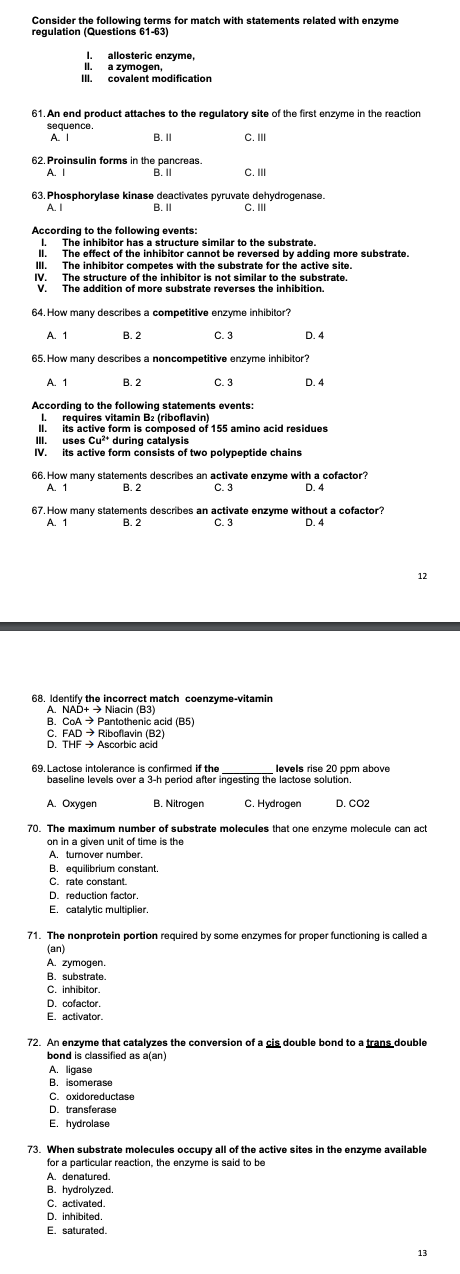
Consider the following terms for match with statements related with enzyme regulation (Questions 61-63) 1. II. III. allosteric enzyme, a zymogen, covalent modification 61. An end product attaches to the regulatory site of the first enzyme in the reaction sequence. A ! B. II C. III 62. Proinsulin forms in the pancreas. . B. II 63. Phosphorylase kinase deactivates pyruvate dehydrogenase. A. C. III B. II According to the following events: I. The inhibitor has a structure similar to the substrate. The effect of the inhibitor cannot be reversed by adding more substrate. The inhibitor competes with the substrate for the active site. IV. The structure of the inhibitor is not similar to the substrate. V. The addition of more substrate reverses the inhibition. 64. How many describes a competitive enzyme inhibitor? A 1 B. 2 D. 4 65. How many describes a noncompetitive enzyme inhibitor? A. 1 B. 2 C. 3 D.4 According to the following statements events: requires vitamin B2 (riboflavin) its active form is composed of 155 amino acid residues III. uses Cuat during catalysis IV. its active form consists of two polypeptide chains 66. How many statements describes an activate enzyme with a cofactor? A. 1 B. 2 C. 3 D.4 67. How many statements describes an activate enzyme without a cofactor? A 1 B. 2 C. 3 D. 4 12 68. Identify the incorrect match coenzyme-vitamin A. NAD+ Niacin (B3) B. COA Pantothenic acid (B5) C. FAD Riboflavin (B2) D. THF Ascorbic acid 69. Lactose intolerance is confirmed if the levels rise 20 ppm above baseline levels over a 3-h period after ingesting the lactose solution A. Oxygen B. Nitrogen C. Hydrogen D. CO2 70. The maximum number of substrate molecules that one enzyme molecule can act on in a given unit of time is the A. turnover number B. equilibrium constant C. rate constant D. reduction factor. E. catalytic multiplier. 71. The nonprotein portion required by some enzymes for proper functioning is called a (an) A. zymogen. B. substrate. C. inhibitor. D. cofactor. E. activator. 72. An enzyme that catalyzes the conversion of a cis double bond to a trans double bond is classified as aan) A. ligase B. isomerase C. oxidoreductase D. transferase E. hydrolase 73. When substrate molecules occupy all of the active sites in the enzyme available for a particular reaction, the enzyme is said to be A. denatured. B. hydrolyzed. C. activated. D. inhibited E. saturated. 13







